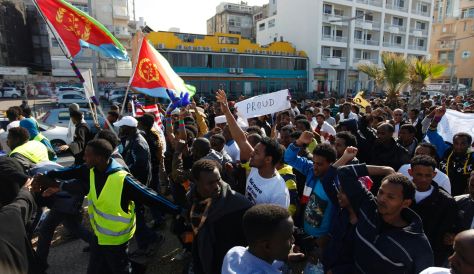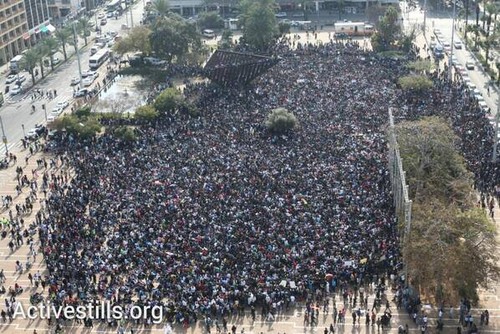Le nuove restrizioni liberticide sulle anti-infiltrazioni del governo Netanyahu hanno portato in piazza a Tel Aviv e a Gerusalemme migliaia di immigrati, in prevalenza lavoratori africanii. La protesta è iniziata sabato, da domenica è stato dichiarato uno sciopero di tre giorni. I cortei diretti alle ambasciate di Francia, Gran Bretagna, Canada e alla sede dell’Unhcr dell’Onu. Ecco gli articoli di Haaretz e Associated Press, e di Nena news del 6.1.14:
Thousands of African migrants march on Tel Aviv embassies
Migrants and asylum-seekers head from south Tel Aviv to U.S. and other missions to demand recognition as refugees and to free those imprisoned.
By Ilan Lior and The Associated Press | Jan. 6, 2014 | 11:57 AM |
Thousands of African migrants in Israel began marching from Levinsky park in south Tel Aviv to the embassies of the United States and other countries Monday morning, continuing the protest that began Sunday.
They are demanding foreign governments exert pressure on Israel to recognize them as refugees, stop arresting them and free those imprisoned.
Some of the embassies they are marching to include France, Britain and Canada. They also marching to the United Nations Refugee Agency, waving Eritrean flags and holding signs saying “No More Prison” and “Freedom.”
The migrants, many of whom are menial laborers in Israel, began a three-day strike Sunday to protest Israeli government policy. Tens of thousands of African migrants went on strike on Sunday, disrupting the normal operation of many businesses, primarily restaurants, cafes, hotels, and cleaning services.
Interior Minister Gideon Sa’ar, in an interview with Ynet, said he is not impressed with all the crying and complaining by propietors. “”With all due respect to the restaurant and café owners in crisis, or those lacking their cleaning staff, this will not determine Israel’s national policy. On the contrary, let’s think about those Israelis who have lost their jobs.”
Sa’ar added, “Garages in Jaffa used to employ Arab workers., not African infiltrators, and Eilat hotels used to employ recently released soldiers. It may be hard to adapt, it’s possible you can employ people for substandard conditions. I recommend everyone try and maintain labor rights by employing people humanely, instead of preaching to the state.”
Instead of going to work, over 20,000 African migrants protested in Tel Aviv’s Rabin Square, chanting “Yes to freedom, no to jail” and “we’re refugees, not criminals.” The protest lasted for about four hours and dispersed without incident. Hundreds of migrants also protested in front of government offices in Eilat.
Protest organizers are calling for the law authorizing their detention in the new Holot facility to be overturned, as well as for Israel to stop rounding up migrants and to release all those jailed under the new law. Israel, they maintain, is obliged to honor the UN Refugee Convention and give reasonable consideration to all asylum requests.
Day two of the protest and strike follows criticism from the UN Refugee Agency (the United Nations High Commissioner for Refugees) on Israel’s policy on African migrants, in particular new amendments to the country’s anti-infiltration law.
Following Sunday’s mass protest of tens of thousands of migrants and their supporters in Tel Aviv, the UNHCR representative in Israel published a rare press release, calling on Israel to consider alternatives to its current “warehousing” of migrants.
The release was titled “Israel’s new laws and policies do not live up to the Spirit of the 1951 Refugee Convention.”
UNHCR has previously criticized the amendments to the anti-infiltration law, and even brought its position before the High Court of Justice, but, until now, has refrained from making public statements. In the press release published Sunday, the agency said that in principle it supports establishing a residence facility for asylum seekers, but not in its current incarnation at Holot.
“I am particularly disquieted about the purpose of the so-called ‘open’ residence facility in Holot which, in its current form and despite its designation as ‘open,’ would appear to operate as a detention center from where there is no release,” UNHCR representative Walpurga Englbrecht said. “This means in effect indefinite detention.
One Eritrean named Davit who protested on Sunday said, “We will continue this struggle until the state of Israel hears our voice and understands that we’re people and refugees. We are here today to continue the freedom march that our brothers began. We are continuing the march because they’re back in jail. They came to Israel as refugees, to seek asylum, but instead of checking their requests, Israel tells them that they, and we, are criminals.”
He also spoke about the Holot detention facility, next to Ketziot prison, which was authorized by a recent amendment to the anti-infiltration law. “Why are the authorities calling Holot an ‘open prison,’ if its in the desert, far from any city and run by the prison services?” he asked. “Refugees are calling us from the prisons, crying that they have no freedom. In recent weeks, many refugees have been chased through the streets by Israeli authorities. We’re afraid to leave our homes.”
He added that the refugees “did not come here to work or to live here our whole lives. As soon as the difficult situation in our countries changes, we will go back to our countries.”
Three weeks ago, the government transferred 483 African migrants who had been imprisoned in Saharonim prison to Holot. Many of them participated in the recent protest march from Holot, and were returned to Saharonim for violating the terms of their residency. Last week, the Population and Immigration Authority began instructing other migrants from Eritrea and Sudan to report to the Holot facility in 30 days, or face imprisonment.
Holot residents are forbidden from working and must report for roll call three times a day, in the morning, afternoon and evening.
Tens of thousands of Africans have trekked through neighboring countries to reach Israel in recent years. Many migrants fled oppression at home, hoping for a better life in Israel, yet their influx sparked tensions with locals who blame them for rising crime and a change of the Jewish identity in some neighborhoods.
Israele, migliaia di migranti in sciopero
Trentamila i manifestanti a Tel Aviv. Oggi 3mila in marcia verso l’ambasciata USA e la sede UE. Protestano contro le politiche di detenzione israeliane “anti-infiltrati”.
adminSito
lunedì 6 gennaio 2014 0
Gerusalemme, 6 gennaio 2014, Nena News – Tre giorni di sciopero, tre giorni in piazza per protestare contro le politiche razziste del governo di Tel Aviv: da ieri sono migliaia i migranti africani in marcia per le strade della capitale israeliana contro la legge anti-infiltrazione appena emendata.
Secondo fonti della polizia, ieri nelle piazze di Tel Aviv erano almeno 10mila i migranti in marcia, ma le associazioni per i diritti umani parlano di 30mila persone: “Chiediamo alla società israeliana di fermare questa legislazione brutale e al governo di rivedere le nostre richieste di asilo e smettere di inviarci nelle prigioni”, ha detto un manifestante alla stampa. “Siamo rifugiati e tutto quello che chiediamo è lavoro – ha commentato un altro eritreo – Non possiamo tornare nei nostri Paesi, è a rischio la nostra vita e quella delle nostre famiglie”.
Stamattina la protesta prosegue: sono tremila i migranti che stanno camminando da Levinsky Park (simbolo delle proteste e ritrovo della comunità africana, ghettizzata a Sud di Tel Aviv) verso l’ambasciata statunitense, la sede dell’Unione Africana, la sede dell’Unione Europea, l’agenzia Onu per i rifugiati e diverse ambasciate europee. “Chiediamo alla comunità internazionale di intervenire e fare pressioni su Israele perché riconosca i nostri diritti”, hanno detto i manifestanti in marcia.
Secondo alcune associazioni per i diritti umani, tra cui Amnesty International, sono già 300 i richiedenti asilo arrestati nelle ultime tre settimane, dal momento in cui la legge ha dato autorità alle forze di polizia di arrestare e detenere in speciali centri i migranti illegali.
Ad oggi sono circa 55mila gli eritrei e i sudanesi residenti in Israele, in un limbo giuridico che impedisce loro di essere riconosciuti come richiedenti asilo e li obbliga ad una vita precaria e di estrema povertà.Considerati “infiltrati” perché entrati senza permesso in territorio israeliano, rischiano la detenzione fino ad un anno in una vera e propria prigione, Holot, nel deserto del Naqab, definita “centro di raccolta” dalle autorità israeliane: i migranti detenuti possono uscire durante il giorno, ma devono presentarsi tre volte per firmare la presenza, un obbligo che rende impossibile condurre una vita normale o cercarsi un lavoro.
Anche le Nazioni Unite alzano la voce contro la nuova politica di detenzione israeliane e le prigioni “aperte” per i richiedenti asilo: il rappresentante dell’UNHCR, Walpurga Englbrecht, ha espresso ieri sostegno ai migliaia di manifestanti ritrovatisi in Piazza Rabin a Tel Aviv e accusato Israele di violare la Convenzione sui Diritti del Rifugiato del 1951, non tenendo in alcun conto la ragione per cui migliaia di africani sono fuggiti dai Paesi di origine, ma limitandosi ad etichettarli come “infiltrati” o “illegali”.
Il clima all’interno dell’opinione pubblica è però sempre più caldo: agli istinti razzisti di gran parte della società israeliana, si aggiungono gli incitamenti e i discorsi violenti di parlamentari e leader di partiti politici, intenzionati a cavalcare l’onda della “paura del diverso” e della “caccia all’immigrato”. Ieri il sindaco di Tel Aviv, Ron Hulda, ha pronosticato un’escalation delle violenze, imputando al governo l’incapacità di affrontare la questione e il tentativo di ignorare sia le richieste degli immigrati che i timori dei residenti: “La manifestazione di oggi è solo l’inizio di un processo che sfortunatamente non potrà che peggiorare. Vedremo violenza nelle strade”.
Molto diverso l’approccio del Likud: ieri il presidente della coalizione Likud-Beitenu, Yariv Levin, ha condannato lo sciopero in corso, definendolo “una bomba a orologeria che può essere disinnescata solo deportando gli infiltrate nel loro Paese d’origine”. Nena News



